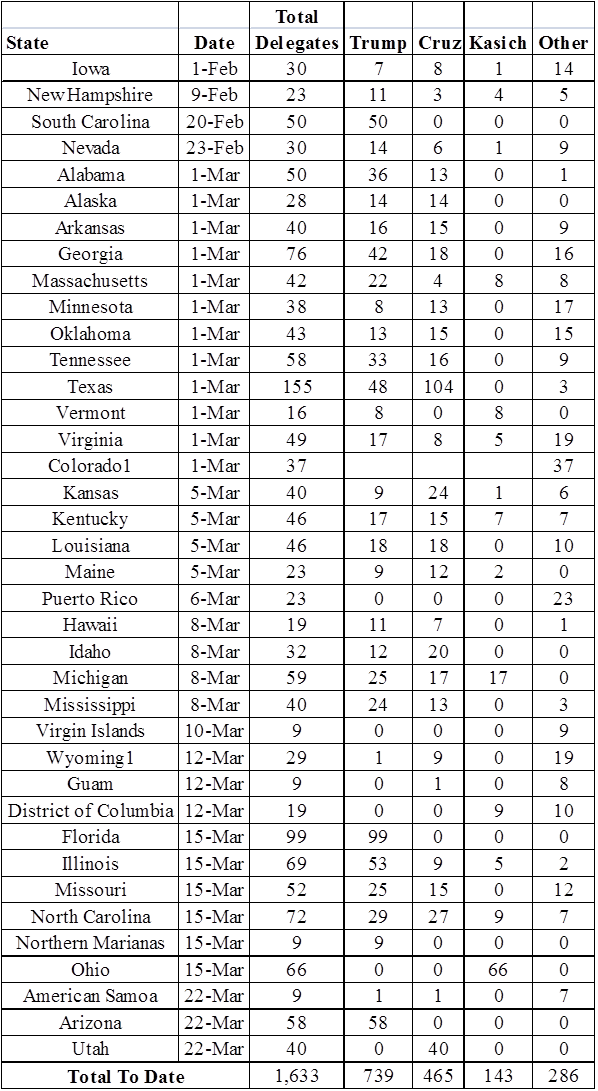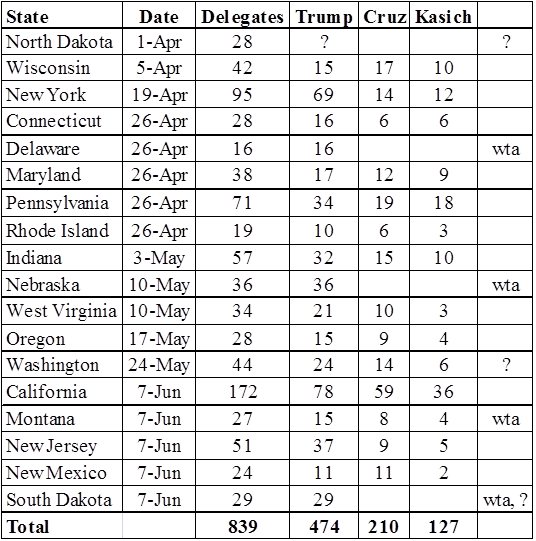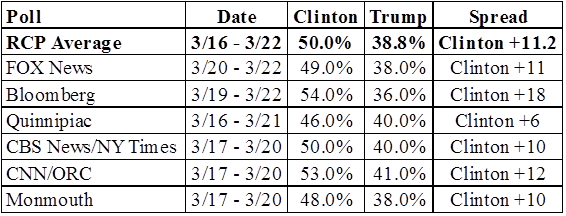
Elliott R. Morss ©All Rights Reserved
Introduction
I am neither a Trump supporter nor detractor. I am an observer of politics – nearly always a great show. I like many of Trump’s foreign policy positions. The Cold War is over, time for the US to rethink our obligations to the rest of the world. And let’s work out a solution between Israel and the Palestinians. Of course, are other things about Trump I don’t like.
But will it be a catastrophe if elected? George Bush got us into two hopeless land wars that resulted in:
- More than 5,000 US deaths and probably 1 million Middle East deaths;
- Outlays of $3 trillion+;
- The destabilization of the Middle East resulting in the emergence of Al-Qaeda and ISIL.
No. Trump would not be as bad as Bush.
There are lots of numbers on the primaries and the elections. In what follows, I try to make sense out of them.
The Primaries and the Presidential Election Are Different
As Nate Silver and others have pointed out, the primaries and the actual Presidential election are basically different. The primaries are “owned/controlled” by the parties. The parties set the rules. And while it is true that if Trump gets the majority of Republican delegates (1,237 out of 2,472), he becomes the Party’s nomination, things could be quite different if he does not. Keep in mind that the “party sets the rules” for what happens at the convention if Trump does not win outright.
And while we have heard considerable opposition to Trump from Republican Party members, there has been little attention given to what effect his nomination would have on Congressional elections. The simple answer is “disaster”. Very few Republican Senators/Congressmen have supported Trump. And Trump has done next to nothing in support them. The Party fears that Trump winning the primaries would give both the House and Senate back to the Democrats.
Will Trump Get the 1,237 Delegates He Needs?
This is the question everyone is asking. My take on this follows. Table 1 shows where we stand today (March 27th).
Table 1. - Republican Primary Outcomes to Date

Source: Real Clear Politics
One unanswered question from Table 1: the “Other” 286 total is a significant number. Who gets these delegates (mostly resulting for candidates that have since dropped out)? Not certain. The candidates voted for will have some influence but it is really up to the state Party leaders.
So what is likely to happen in the remaining primaries? Nothing is certain. But I guessed based on recent polling numbers (Table 2). Most of the numbers came from Real Clear Politics with supplements from Isidewith. A “?” in the right hand column means no polls available. A “wta” means it is a “winner take all state. For the states with no polls, I used the average percent distribution for the totals of states with polls for the allocation between Trump, Cruz and Kasich.
Table 2. – Republican Primary Guesses

Sources: Real Clear Politics, Isidewith
If we put these “guesses” together with the numbers in Table 1, Trump gets a total of 1,213 delegates or 24 less than he needs to have won going into the Republican convention. But what about the 286 delegates listed in Table 1 won by other candidates? If the majority of them went to Trump, he would have more than half going into the convention.
The only conclusion one can draw from this exercise – too close to call at this point. And while sex scandals are common among politicians (consider Clinton, Edwards, and Hart), the current dialogue between Trump and Cruz is probably hurting them both. If you look at states with enough surveys to see a trend, Trump’s margins in California, Connecticut, Michigan and Pennsylvania are declining.
While it is uncertain if Trump will have a majority going into the convention, he will have so many delegates for him it is extremely unlikely the convention will nominate someone else. So assuming Trump is the Republican Presidential candidate, we go forward to the Presidential Election.
The Presidential Election
Once again, we look at the poll numbers. And in this case, unlike the primary outcome, the numbers are quite clear: Trump has no chance against Hillary Clinton. As Table 3 indicates, Clinton leads Trump by a large spread. And her lead is growing: as recently as the 1st of February, Clinton was only ahead 47.5% to Trump’s 44%. The media will want to think it will be close but probably not.
Table 3. – Recent Polls, Clinton vs. Trump

Source: Real Clear Politics
I have heard some say Trump will crush Clinton in the debates. This is not likely. Clinton has had plenty of training in the grillings she has taken from the Republicans in various Congressional hearings. It is more likely she will outperform Trump because of her extensive knowledge and experience on all policy issues.



